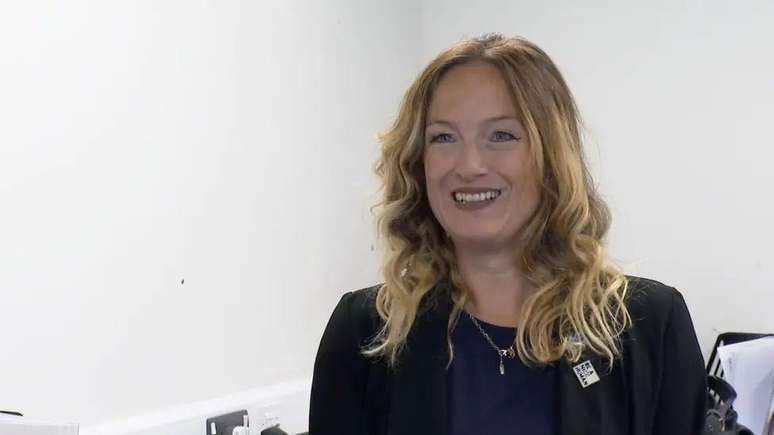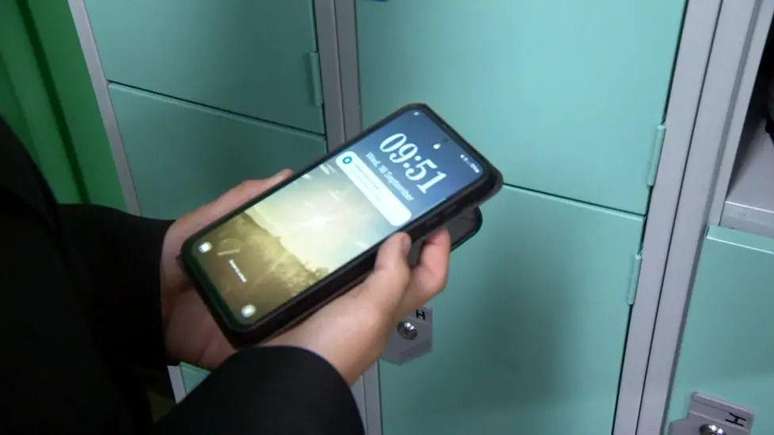The government has guided schools on how to deal with smartphones, but the decision is up to each school. This year many have started banning cell phones.
“Children are glued to their cell phones and don’t even notice anything around them. They look more like zombies.”
This was stated by the director of a school in Sheffield, a city in the north of England, which recently banned the use of smartphones, smartwatches (watches with Internet access) and headphones on its premises.
Any student caught using one of these devices must turn it in to school administration. The gadgets remain at school and are only returned the following day.
Students at Forge Valley School said it took some time to get used to the idea, but that they began interacting much more with their classmates in the absence of phones.
School principal Dale Barrowclough said he was confident the new policy would work and be here to stay.
A new school year began in the UK last month and many students and parents were surprised that schools banned mobile phones. The ban is not a national policy: it comes from the schools themselves, who complain about the negative impact that the various devices have on students’ academic development and social life.
Earlier this year, the Department for Education published guidance to limit mobile phone use during school hours and to “minimise disruption and improve behavior in classrooms”.
More and more schools are creating their own policies of this type.
In north London, 60 schools are reviewing their policies on school phone use following a campaign by Smartphone Free Childhood (SFC), a charity which aims to reduce mobile phone use among children.
The organization asks parents to delay purchasing smartphones until their children are at least 14 years old. And it also asks that access to social media be allowed only after the age of 16.
The SFC also encourages parents to purchase other types of phones that are not smartphones and that only allow calls and text messages. Some models have basic games (like Tetris) and have access to podcasts and music, but not the Internet and social networks.
According to the SFC, across the UK, hundreds of thousands of parents are joining the movement. In North London alone, more than 2,500 parents from almost 200 schools are supporting the cause.
“Not yet” instead of “never”
Nova Eden, SFC’s regional manager for north London, said the aim of the campaign is for children to learn to prioritize their short childhoods, for example by spending time with family or learning new skills.
“What we are advocating is not ‘never,’ but simply ‘not yet,’” he said.
“While children’s brains are still developing, it is much healthier for them to enjoy their childhood by playing, rather than being glued to smartphones and social media,” says the activist.
“Our campaign is not suggesting that children don’t have a phone at all. Instead we are proposing an old-fashioned phone that allows calling and texting, but without the dangers of having the Internet in a child’s pocket for 12 hours a day, where strangers you can contact them.”
“Children don’t need smartphones, children need a childhood.”
At Boston Grammar School, which has banned smartphones, the vice principal said that “where you used to see students looking at their phones, now you see interactions.”
“We wanted to eliminate this toxicity from our school day. What we found was a significant reduction in the number of normal incidents that would have been made worse by cell phones.”
The headteacher of a school in Devon (south-west England), which banned the use of mobile phones five years ago, says that teachers have noticed improvements in their academic performance and social life.
UTC Plymouth allows students to bring their own mobile phones to school, but they must hand them in to management at the start of the day. Headteacher Jo Ware said the policy had helped raise standards at the school.

Phoebe, a student at Sacred Heart Catholic Academy in Liverpool, said her school’s smartphone policy helps students focus on their work.
“If the rule didn’t exist, I think kids would use their cell phones a lot more,” he said. “It teaches kids the discipline of not using cell phones and really focusing in class.”
50 messages and notifications per day
At Fulham Boys School in west London, headteacher David Smith interviewed students to understand the impact of smartphones on their lives.
It found that 97% of students estimate they receive more than 50 notifications and messages per day and that 38% of students could use their phone without any restrictions.
The decision to ban smartphones was communicated to parents in a letter in May. The parents’ reaction was not unanimous.
Some parents said the school was trying to deal with a lost cause.
But others were more receptive, particularly parents of younger children who said the school policy eased the pressure they feel to buy smartphones for children who don’t already own them.
Smith appealed to parents not to compromise their principles and buy smartphones for very young children.
And if they already have a smartphone, he asks parents to monitor the frequency of use and have open conversations about it.
Smith used the same expression as the Sheffield school headteacher: he says children are turning into “zombies” due to social media algorithms. He is also concerned about the influence of personalities such as YouTuber Andrew Tate, who promote so-called “toxic masculinity”.
“My strong opinion is that we need to educate young people about sex before they have sex – it’s really important to educate them before they engage in sexual activity. But we need to educate young people and parents about phones when kids already have phones.”

Cell phone bans are being implemented in several places this year.
One of England’s largest school associations, which runs 42 public schools across the country, is starting to restrict access to smartphones for around 35,000 students in its schools.
One of the UK’s most traditional schools, Eton College, where several former British prime ministers have passed, began providing phones without internet to its students when classes resumed last month.
The devices, which can only send and receive text messages and calls, were given to students as young as 13.
Criticism from some parents
But not everyone agrees with school policies.
Many parents have complained about blanket ban policies, arguing that cell phones are an important part of modern life.
“A total ban is dangerous and irresponsible,” says Joe Mayatt of Hastings. He says his children rely on smartphones to check bus schedules and pay for purchases.
“I would prefer if they could contact me at any time. I agree that they should not be worn during school hours, but the school neglects their well-being before and after.”
MP Helena Dollimore raised the issue in the British Parliament, saying that parents supported a ban on telephone use at school but were concerned about children’s safety on the way to and from home.
Stacey Holohan has an 11-year-old son who attends Queen’s Park Community School in London. She says her son has a smartphone that he uses to call, but doesn’t have access to social media.
The school does not allow smartphones. He agrees with the policy for younger children, but says a child shouldn’t wait until age 14.
Stacey said: “They go to school and come from far away. How will they communicate with their parents if something happens? If there’s an accident and they’re late? It’s more peace of mind for the parents.”

What does the government say?
After three years of raising concerns about mobile phones in schools, the UK government published guidelines for schools in February this year.
The guide provides a number of examples to illustrate how a phone-free environment can be achieved, including an outright ban on smartphone use in schools or rules requiring devices to be handed over at the start of the day.
The government document also states that schools can allow students to keep their phones, but “only under the strict condition that they are never used, seen or heard” during the day.
The guidance states that schools should “develop and implement a policy… that reflects the individual contexts and needs of each school”.
It adds that schools have a legal duty to ensure the wellbeing of students and that stopping phone use during the day is “essential” to ensure teachers can teach.
Principals are authorized to search students for items prohibited by school rules and are legally protected against lawsuits for loss or damage to confiscated items.
The government also cited a survey of high school students in which 29 percent of respondents reported that smartphones were being used when they shouldn’t be in most or all classes.
School workers’ union, the Association of School and College Leaders (ASCL), criticized the Government’s guidance and said it was unlikely to have any noticeable effect.
For the association, the problem is not regulating the use of cell phones in schools, but rather regulating the content accessible to children on the Internet.
“Most schools already ban the use of mobile phones during school hours, or only allow their use in limited circumstances,” general secretary Geoff Barton said.
“We’ve lost count of the number of times politicians have announced a crackdown on cell phones in schools. It’s a non-policy for a non-issue.”
“The government would be much better off investing its energy in limiting the online platforms through which children can access disturbing and extreme content.”
Source: Terra
Rose James is a Gossipify movie and series reviewer known for her in-depth analysis and unique perspective on the latest releases. With a background in film studies, she provides engaging and informative reviews, and keeps readers up to date with industry trends and emerging talents.






